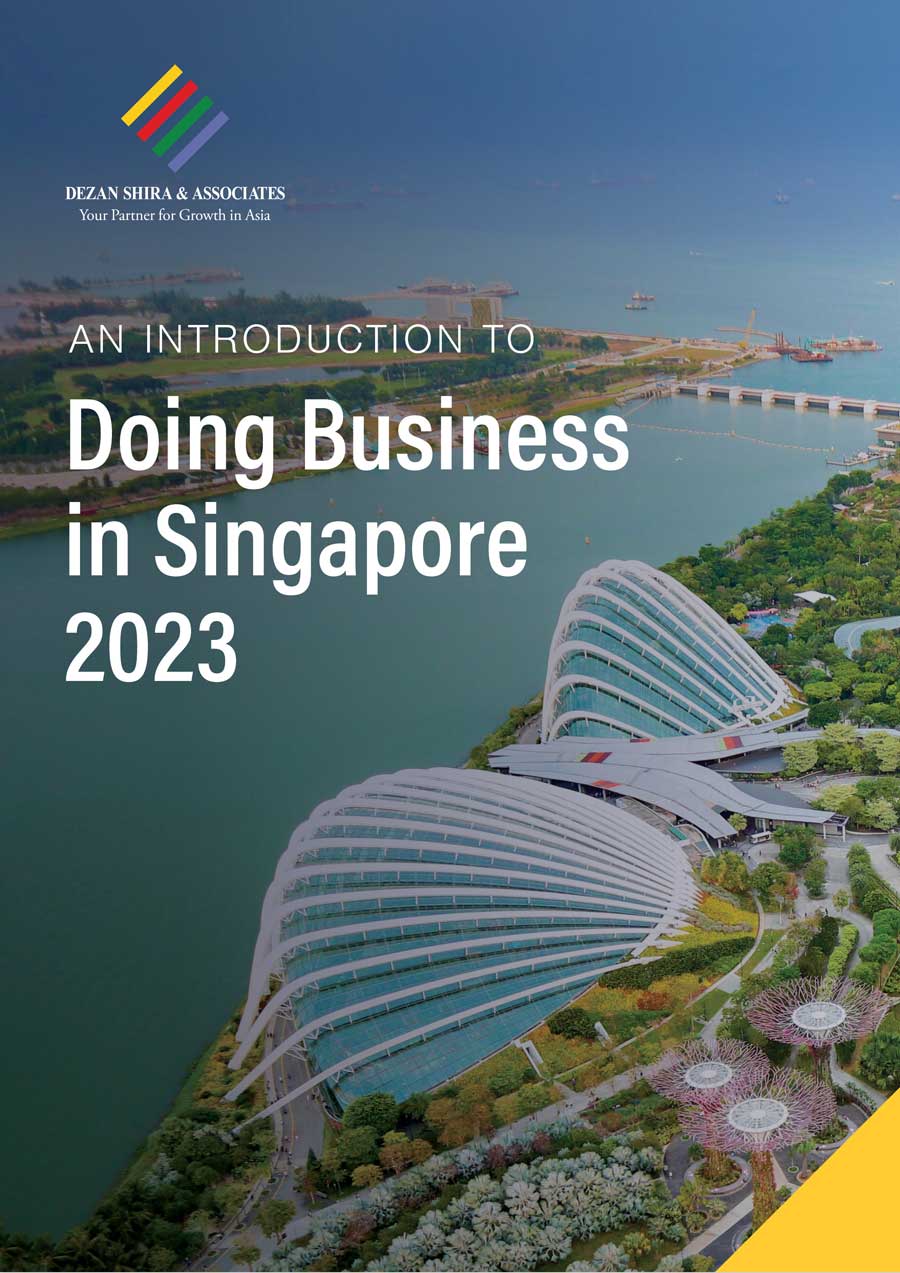[ad_1]
An Introduction to Doing Business in Singapore 2023, the latest publication from Dezan Shira & Associates is out now and available for download through the Asia Briefing Publication Store.
 Despite global uncertainties, Singapore’s robust economy continues to thrive, with projected GDP growth of 0.5 to 2.5 percent in 2023 and an even brighter outlook for 2024. As a strategic financial hub and a gateway to Asia, Singapore offers unparalleled opportunities for foreign investors.
Despite global uncertainties, Singapore’s robust economy continues to thrive, with projected GDP growth of 0.5 to 2.5 percent in 2023 and an even brighter outlook for 2024. As a strategic financial hub and a gateway to Asia, Singapore offers unparalleled opportunities for foreign investors.
With over 80 double taxation avoidance agreements, generous tax deductions, an extensive network of free trade agreements with neighboring nations, and a reputation as a global financial center, businesses operating in Singapore can maximize their profitability and expand their reach.
Amid the risks associated with the fallout of the COVID-19 pandemic, Singapore continues to demonstrate its resilience, providing direct access to global markets. While external demand has softened, Singapore’s manufacturing and wholesale trade sectors remain robust and primed for growth.
For corporate entities hoping to establish a holding company, branch office, or regional headquarters, Singapore offers a powerful advantage in terms of business opportunities, government incentives, and trade relations benefits.
This publication, designed to introduce the fundamentals of investing in Singapore, was compiled by Dezan Shira & Associates, a specialist foreign direct investment practice providing corporate establishment, audit, business advisory, tax advisory and compliance, accounting, payroll, due diligence, and financial review services to multinationals and small- and medium-sized enterprises investing in emerging Asia.
An Introduction to Doing Business in Singapore 2023 covers the following:
- Corporate establishment;
- Taxation;
- Human resources and payroll; and
- Audit and compliance.
What’s new in this guide?
Singapore has continued to implement strategic reforms to improve the business climate for foreign investors. Most of these reforms relate to implementing stricter requirements for the hiring of foreign workers.
We also highlight Singapore’s plan to introduce a 15 percent minimum tax rate for multinational enterprises (MNEs) from January 2025. These changes are part of the Base Erosion and Profit Shifting initiative, or BEPS 2.0, a global framework that aims to ensure a fairer distribution of tax rights on large MNEs through a set global minimum tax (GMT) rate. Singapore has also increased the goods and services tax (GST) by one percent to eight percent for 2023, which will be increased to nine percent in 2024.
Singapore’s government has also issued a variety of support for businesses as they transition to a post-COVID-19 world and combat elevated inflation and growth slowdown. These include tax deductions for research and development (R&D) as well as for innovation, among others.
Corporate establishment
This chapter highlights the relevant process for establishing an entity in Singapore be it a private limited company, branch office, or representative office.
Those entering Asia for the first time, for instance, may want to set up a low-risk, exploratory presence in the form of a representative office, while those looking to use Singapore as a springboard to access the ASEAN markets may need more strategic commitments by setting up a branch office or subsidiary company.
Taxation
Singapore has increased its GST rate for 2023 from seven to eight percent. Further, since January 1, 2023, Singapore has imposed GST on imported low-value goods. Given the rapid rise of the e-commerce sector in Singapore and the Southeast Asia region, there has been significant growth in the number of imported low-value goods in Singapore. As such, the government wants to ensure a level playing field for businesses in Singapore so that overseas suppliers are subject to the same GST treatment as local suppliers.
Moreover, Singapore’s Budget 2023 announced that the country will introduce a 15 percent minimum effective tax rate for large MNEs based in Singapore from January 1, 2025. These changes are part of the BEPS 2.0.
Human resources and payroll
Singapore has introduced a new points system for Employment Pass (EP) applicants from 2023, in addition to higher qualifying salary thresholds.
The government hopes that the new system – laid out under the Complementarity Assessment Framework (COMPASS) – will improve the capacity of Singaporean businesses to select high-quality foreign professionals and ensure workforce diversity.
The country has also introduced the Overseas Network & Expertise Pass, which allows high-earners and achievers to live in Singapore without the need to secure employment first.
Incentives for business
Singapore has enhanced several of its key incentives to support businesses. However, most of these incentives have local ownership requirements. Companies setting up in Singapore are eligible for various fiscal and non-fiscal incentives if their business is deemed beneficial to the country’s economic development.
About Us
ASEAN Briefing is produced by Dezan Shira & Associates. The firm assists foreign investors throughout Asia and maintains offices throughout ASEAN, including in Singapore, Hanoi, Ho Chi Minh City, and Da Nang in Vietnam, in addition to Jakarta, in Indonesia. We also have partner firms in Malaysia, the Philippines, and Thailand as well as our practices in China and India. Please contact us at asean@dezshira.com or visit our website at www.dezshira.com.
[ad_2]
Source link
